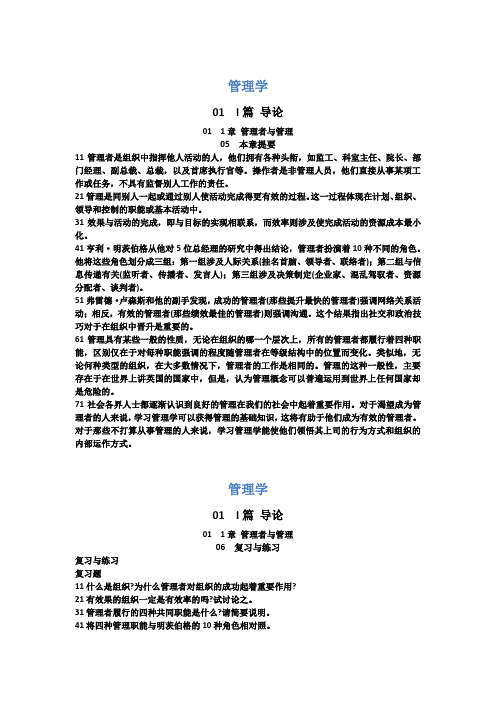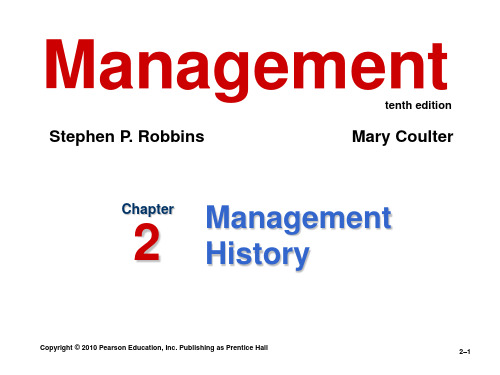罗宾斯管理学英文版02章
罗宾斯《管理学》 (2)

管理学01 I篇导论01 1章管理者与管理05 本章提要11管理者是组织中指挥他人活动的人,他们拥有各种头衔,如监工、科室主任、院长、部门经理、副总裁、总裁,以及首席执行官等。
操作者是非管理人员,他们直接从事某项工作或任务,不具有监督别人工作的责任。
21管理是同别人一起或通过别人使活动完成得更有效的过程。
这一过程体现在计划、组织、领导和控制的职能或基本活动中。
31效果与活动的完成,即与目标的实现相联系,而效率则涉及使完成活动的资源成本最小化。
41亨利·明茨伯格从他对5位总经理的研究中得出结论,管理者扮演着10种不同的角色。
他将这些角色划分成三组:第一组涉及人际关系(挂名首脑、领导者、联络者);第二组与信息传递有关(监听者、传播者、发言人);第三组涉及决策制定(企业家、混乱驾驭者、资源分配者、谈判者)。
51弗雷德·卢森斯和他的副手发现,成功的管理者(那些提升最快的管理者)强调网络关系活动;相反,有效的管理者(那些绩效最佳的管理者)则强调沟通。
这个结果指出社交和政治技巧对于在组织中晋升是重要的。
61管理具有某些一般的性质,无论在组织的哪一个层次上,所有的管理者都履行着四种职能,区别仅在于对每种职能强调的程度随管理者在等级结构中的位置而变化。
类似地,无论何种类型的组织,在大多数情况下,管理者的工作是相同的。
管理的这种一般性,主要存在于在世界上讲英国的国家中,但是,认为管理概念可以普遍运用到世界上任何国家却是危险的。
71社会各界人士都逐渐认识到良好的管理在我们的社会中起着重要作用。
对于渴望成为管理者的人来说,学习管理学可以获得管理的基础知识,这将有助于他们成为有效的管理者。
对于那些不打算从事管理的人来说,学习管理学能使他们领悟其上司的行为方式和组织的内部运作方式。
管理学01 I篇导论01 1章管理者与管理06 复习与练习复习与练习复习题11什么是组织?为什么管理者对组织的成功起着重要作用?21有效果的组织一定是有效率的吗?试讨论之。
斯蒂芬·P·罗宾斯《管理学》笔记2

斯蒂芬·P·罗宾斯《管理学》笔记第二章管理的昨天和今天一、管理与其他研究领域的联系1、人类学:有助于管理者更好地理解不同国家和不同组织中人们的基本价值观、态度和人们行为的差异。
2、经济学:提供了理解变化中的经济以及竞争和自由的全球市场环境的作用。
如:为什么运动鞋都是在亚洲国家制造?这可用经济学的竞争优质给出答案。
3、哲学:有助于考察事物的本质,特别是价值观和伦理道理,帮助管理者理解组织为什么存在以及什么行为对一个组织是适当的命题。
4、政治学:研究个人和群体在政治环境中的行为。
帮助管理者理解冲突的结构、在经济系统中权利的分配、个人如何为了自己的利益操纵权利、政府的影响。
5、心理学:帮助管理者理解人类的行为。
6、社会学:帮助管理者理解人与人之间的关系。
二、管理的历史背景20世纪前,管理方面的主要贡献1、埃及金字塔的建设、中国的长城,规模恢宏,管理者是如何进行计划、组织、领导和控制的?公元15世纪的威尼斯城的生产、运输、仓储、人事、会计模式表明组织管理已付诸实施。
2、1776年亚当·斯密关于劳动分工的著作《国富论》(the Wealth of Nations):将工作分解成狭窄的和重复性的任务,提高了工人技巧和熟练程度,导致工作专业化。
3、20世纪前的产业革命:以机械代替手工,大大提高劳动效率,对管理技能提出了更高的要求。
诸如管理者需要预测需求、分配人员工作、指挥每天的活动、协调各种任务、保证机器运行等。
计划、组织、领导和控制就成为必不可少的了,管理理论也应运而生。
4、管理进程:科学管理(1880s)--------行为科学(1920s)------管理科学(1950s)。
三、科学管理:从如何改进作业人员生产率的角度看管理。
1、主要学者:泰罗+吉尔布雷思夫妇2、泰罗的四条管理原则——关注管理的最低层次,追求完成每项具体工作的最佳方法,被称为“科学管理之父”。
①对工人的每一个要素开发出一种科学的方法,代替老的经验方法。
管理学,罗宾斯,版,英文Robbinsfom

1-26
Why Are Customers Important?
Consistent, high-quality customer service is essential to survival
Copyright © 2015 Pearson Education, Inc.
1-27
Why Is Innovation Important?
1-19
Which Approach Takes the Prize?
Functions ☑
Roles
☐
Copyright © 2015 Pearson Education, Inc.
1-20
What Skills Do Managers Need?
Conceptual Skills
Interpersonal Skills
1-22
Why Study Management?
We all have a vested interest in improving how organizations are managed.
Copyright © 2015 Pearson Education, Inc.
1-23
Why Study Management? (cont.)
1-6
Copyright © 2015 Pearson Education, Inc.
1-7
What Titles Do Managers Have?
Top Managers • Make decisions about the direction of an organization
Middle Managers • Manage other managers
管理学,罗宾斯,9版,英文Robbins_fom9_ppt(2)

9-11
Personality Theories
Personality: A unique combination of emotional, thought, and behavioral patterns that affect how a person reacts to situations and interacts with others.
Copyright © 2015 Pearson Education, Inc.
9-22
Perceptual Shortcuts
Copyright © 2015 Pearson Education, Inc.
9-23
Understanding Perception
1. Employees react to perception, not reality. 2. The potential for perceptual distortion exists.
Copyright © 2015 Pearson Education, Inc.
9-6
9.2 Explain the role that attitudes play in job performance.
Copyright © 2015 Pearson Education, Inc.
9-7
Attitudes and Job Performance
9-15
Matching Personalities and Jobs
Copyright © 2015 Pearson Education, Inc.
9-16
Personality Traits Across Cultures
National cultures differ in terms of the degree to which people believe they control their environment.
管理学(斯蒂芬 罗宾斯 第九版)英文课件(第二章)

– Industrial Revolution • substitution of machine power for human power • large organizations required formal management
– Describe the contributions of the general administrative theorists一般行政管理
– Summarize the quantitative approach定量方法 to management
– Describe the contributions of the early organizational behavior组织行为 advocates
© Prentice Hall, 2002
2-13
EARLY ADVOCATES OF OB
© Prentice Hall, 2002ehavior (cont.)
Hawthorne Studies
– started in 1924 at Western Electric Company
– use of scientific methods to define the “one best way” for a job to be done
– perspective of improving the productivity and efficiency of manual workers
罗宾斯管理学第九版第二章(英文版)

高二语文必修1-必修4必背篇目测试一、必修至必修四上下句默写(20分)1.骐骥一跃,不能十步。
驽马十驾,功在不舍。
(荀子《劝学》)2.锲而舍之,朽木不折;锲而不舍,金石可镂。
(荀子《劝学》)3.句读之不知,惑之不解,或师焉,或不焉,小学而大遗,吾未见其明也。
(韩愈《师说》)4.清风徐来,水波不兴。
举酒属客,诵明月之诗,歌窈窕之章。
(苏轼《赤壁赋》)5.浩浩乎如冯虚御风,而不知其所止;飘飘乎如遗世独立,羽化而登仙。
(苏轼《赤壁赋》)6.乱石穿空,惊涛拍岸,卷起千堆雪。
江山如画,一时多少豪杰。
7.想当年,金戈铁马,气吞万里如虎。
《京口北固亭怀古》8.亦余心之所善兮,虽九死其犹未悔;路曼曼其修远兮,吾将上下而求索《离骚》9.剑阁峥嵘而崔嵬,一夫当关,万夫莫开。
《蜀道难》10.弟走从军阿姨死,暮去朝来颜色故。
门前冷落鞍马稀,老大嫁作商人妇。
二、必修至必修四情景式默写(60分)1.《氓》中与“青梅竹马”意境相仿的一句是:总角之宴,言笑晏晏。
2. 《氓》中通过写桑叶凋落喻指女子年华逝去的一句是:桑之落矣,其黄而陨。
3. 《氓》中写男子变化无常,三心二意的句子是:士也罔极,二三其德.4.《离骚》一文中以博大的胸怀,对广大劳动人民寄予深深同情的语句是:长太息以掩涕兮,哀民生之多艰。
5.《离骚》中用香草做比喻说明自己遭贬黜是因为德行高尚的两句:既替余以蕙纕兮,又申之以揽茝。
6.《离骚》中用大鸟和小鸟不合群来比喻说明自己绝不随波逐流的两句:鸷鸟之不群兮,自前世而固然。
7.《离骚》中屈原委婉表达自己后悔选择做官,想要归隐的两句:悔相道之不察兮,延伫乎吾将反。
8. 《赤壁赋》中概括了曹操军队在攻破荆州顺流而下的军容盛状的句子是:舳舻千里,旌旗蔽空。
9.苏轼在《赤壁赋》中慨叹“人生短促,人很渺小”的句子是:寄蜉蝣于天地,渺沧海之一粟。
10. 《赤壁赋》中写希望与神仙相交,与明月同在的句子:挟飞仙以遨游,抱明月而长终。
11.《蜀道难》的主旨句是:蜀道之难,难于上青天。
罗宾斯《管理学》第十版 英文课件 第二章

2.4 Behavioral approach.
• Describe the contributions of the early advocates of
OB. • Explain the contributions of the Hawthorne Studies to the field of management. • Discuss how today’s managers use the behavioral approach.
Substituted machine power for human labor Created large organizations in need of management
Copyright © 2010 Pearson Education, Inc. Publishing as Prentice Hall 2–5
2–2
2.2 Classical Approach.
• • •
Copyright © 2010 Pearson Education, Inc. Publishing as Prentice Hall
Learning Outcomes
2.3 Quantitative Approach.
• Explain what the quantitative approach has contributed to the field of management. • Describe total quality management. • Discuss how today’s managers use the quantitative approach.
Management
Stephen P. Robbins
管理学罗宾斯第11版02名师制作优质教学资料

Management, Eleventh Edition by Stephen P. Robbins & Mary Coulter
©2012 Pearson Education, Inc. publishing as Prentice Hall
2-5
Environmental Uncertainty and Complexity
Management, Eleventh Edition by Stephen P. Robbins & Mary Coulter
©2012 Pearson Education, Inc. publishing as Prentice Hall
2-4
Exhibit 2-2: Components of External Environment
©2012 Pearson Education, Inc. publishing as Prentice Hall
2-13
How Do Employees Learn Culture?
Stories - Narratives of significant events or people, e.g. organization founders, rule breaking, reaction to past mistakes etc.
©2012 Pearson Education, Inc. publishing as Prentice Hall
2-10
What Is Organizational Culture?
Organizational Culture - The shared values, principles, traditions, and ways of doing things that influence the way organizational members act.
- 1、下载文档前请自行甄别文档内容的完整性,平台不提供额外的编辑、内容补充、找答案等附加服务。
- 2、"仅部分预览"的文档,不可在线预览部分如存在完整性等问题,可反馈申请退款(可完整预览的文档不适用该条件!)。
- 3、如文档侵犯您的权益,请联系客服反馈,我们会尽快为您处理(人工客服工作时间:9:00-18:30)。
Copyright © 2005 Prentice Hall, Inc. All rights reserved.
2–4
L E A R N I N G O U T L I N E (cont’d)
Follow this Learning Outline as you read and study this chapter.
oToward Understanding Organizational Behavior (cont’d)
• Discuss the criticisms of the Hawthorne Studies. • Discuss how today’s managers use the behavioral
Taylor and Frank and Lillian Gilbreth. • Explain how today’s managers use scientific management.
Copyright © 2005 Prentice Hall, Inc. All rights reserved.
administrative theory of management, • Define the characteristics of a bureaucracy • Explain how today’s managers use general administrative
theory.
Copyright © 2005 Prentice Hall, Inc. All rights reserved.
2–2
L E A R N I N G O U T L I N E (cont’d)
Follow this Learning Outline as you read and study this chapter.
oGeneral Administrative Theorists
• Tell what the general administrative theorists brought to the study of management.
the field of management. • Discuss how today’s managers may not be comfortable
with the quantitative approach.
•Toward Under Organizational Behavior
• Define organizational behavior. • Describe the contributions of the early advocates of OB. • Describe the design of the Hawthorne Studies. • Explain the contributions of the Hawthorne Studies to the
Revolution are important to the study of management. • List six management approaches.
• Scientific Management
• Define scientific management. • Describe the important contributions made by Fredrick W.
2–3
L E A R N I N G O U T L I N E (cont’d)
Follow this Learning Outline as you read and study this chapter.
oQuantitative Approach to Management
• Define the quantitative approach and how it evolved. • Explain what the quantitative approach has contributed to
8th edition Steven P. Robbins
Mary Coulter
PowerPoint Presentation by Charlie Cook Copyright © 2005 Prentice Hall, Inc. All rights reserved.
LEARNING OUTLINE
• Describe how Fayol viewed the practice of management • Explain why Fayol developed his principles of
management. • Discuss Fayol’s 14 management principles. • Describe Max Weber’s contribution to the general
approach.
oThe Systems Approach
• Define a system. • Contrast closed systems and open systems. • Describe an organization using the systems approach. • Discuss how the systems approach is appropriate for
Follow this L and study this chapter.
o Historical Background of Management
• Explain why studying management history is important. • Describe some early evidences of management practice. • Discuss why division of labor and the Industrial
